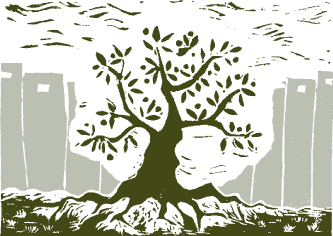
© Charlotte Marshall/Sabeel-Kairos
Interview with Bissan Kassis
“My father was arrested when I was 6 years old. It would be the first time of many. My childhood ceased to exist. I realised my life was not in my control”
As Bissan Kassis tells me her story from an office in Beit Sahour, it’s hard to imagine that this confident, intelligent young woman, who’s English flows as easily as her Arabic, was once the young girl so affected by her father’s arrest. And yet hearing her story, it is an event that has not only shaped her personal life, but her professional one as well.
Bissan is 32 years old, married, with a young son. We spend some time laughing together about the challenges of being working mums – something that transcends culture and nationality. Not only are our sons a similar age, but our work is similar too – advocacy and campaigning for Palestinian human rights.
Bissan works for OPGAI – a network of eleven human rights organisations in occupied Palestine and the Syrian Golan Heights. Their ultimate aim is to create a social movement that seeks a progressive, resilient end to the occupation, and restores the full rights of Palestinians. No small task then, but Bissan doesn’t seem daunted by it. She has grown up in a culture of creative resistance that started in the first intifada in Beit Sahour
“I was a child of the first intifada – I belong to the stone throwing generation” she says. “Beit Sahour was the foundation of the civil resistance movement against the occupation. My father was part of the movement that mobilised people to refuse to pay their taxes to Israel, one of the many reasons he was taken to jail”
If you think that not paying your taxes and burning your ID card are fairly harmless forms of resistance then the reaction from Israel might change your mind. The campaign ‘no taxation without representation’ bought a wave of destruction down on Beit Sahour by the Israeli government, who sent the Israeli Defence Forces (IDF) in to confiscate everything in people’s homes and businesses, to punish those that had initiated the campaign, and those that implemented it, including Bissan’s father.
“Until then, the occupation wasn’t a reality. That changed everything. 20 armed soldiers storming your house changed my world forever”
But despite the hardship of losing her father many times to an Israeli prison, Bissan has used this experience to drive her passion for change. Leaving Palestine at the end of school to study in the Netherlands, she spent many years abroad, but always felt the tug to return. On doing so she became part of the international BDS movement against Israel, and has continued to be a key figure in the movement.
“Campaigning is so important – its shows, and proves, that we have a right to resist our circumstances, and that right cannot be taken away”
Bissan is passionate that the BDS movement can bring about change, and she tells me about some of the successes it has seen. Last year alone, French multinational company Veolia lost over $26 billion in contracts that were cancelled because of the BDS campaign. Israeli company Mekorot lost a $170 million contract with Argentina because of pressure from the campaign. Even the local boycott in Palestine is gaining momentum, with Israeli dairy products amongst others suffering in sales.
As well as campaigning on BDS, Bissan is also challenging the regularisation of life under occupation.
“Although there is still a collective consciousness about resisting the occupation, at an individual level people are just trying to get on with their lives” she says. Here in the West Bank we have the ‘sweet’ occupation – they (Israel) control everything, but often there is no immediate threat. It’s different in Gaza”.
‘Things are not better’ she continues to tell me. When the danger was violently obvious you knew someone was screwing up your life. But now apathy exists, and we have to challenge that, to keep up our movement of creative resistance
“I work for the sake of my son. I never had a proper childhood, and now he is growing up under the same occupation, living in fear about whether his father will be taken away one day. You have to work for the sake of your son too – so he isn’t bought up in a world of injustice.”
For more information about the Boycott, Divestment and Sanctions movement, and how you can get involved, please click here.
